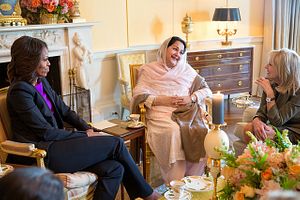Sunday’s by-election on the National Assembly seat vacated by ousted Prime Minister Nawaz Sharif in Lahore can be interpreted as a win for every major political stakeholder in Pakistan right now.
For the actual winners, the ruling Pakistan Muslim League-Nawaz (PML-N), it was vindication of their stance that masses still support Nawaz despite the Supreme Court’s decision to dismiss him.
Maryam Nawaz, spearheading the campaign on behalf of her mother, said in the aftermath of the unofficial results that massed rejected the “court verdict based on injustice and announced their decision.”
Elsewhere, the PML-N leaders have regularly suggested that the NA-120 by-poll was actually a verdict against the “forces” behind Nawaz’s ouster – a reference to the all-powerful military establishment, believed to be influential in the decision against the former premier.
Meanwhile, the Pakistan Tehrik-e-Insaf (PTI), that had orchestrated the campaign for Nawaz’s dismissal can claim victory over the fact that their candidate – Yasmin Rashid – reduced the gap to 14,000, after having lost the 2013 election to Nawaz Sharif by 40,000 votes.
The PTI Vice President Shah Mehmood Qureshi has dubbed giving the PML-N “a tough time in their home constituency” a victory for his party. Reports of Maryam Nawaz being unhappy with the victory margin, further establish PTI’s claims.
Furthermore, the military establishment, that has backed jihadist-backed political groups, would be pleased to see the Milli Muslim League (MML) candidate bag 5,822 votes – over four times that of the Pakistan Peoples’ Party (PPP), which had formed the federal government before the PML-N – in little over four weeks of existence.
The MML is the political front of the Jamaat-ud-Dawa (JuD), a proscribed group that itself fronts as a charity to the Lashkar-e-Taiba (LeT), whose leader Hafiz Saeed – believed to be the Mumbai Attack mastermind – is currently under house arrest.
It is differences over “mainstreaming” these militant groups that eventually led to the much publicized Dawn Leaks scandal last year, based on a report that broke the news of a civil-military rift that included a high profile confrontation between the Sharifs and Army leadership over jihadist leaders including Saeed.
The Dawn Leaks scandal is believed to have had a sway in whatever involvement the establishment had in the verdict to oust Nawaz Sharif.
That MML’s Sheikh Yaqoob received votes — despite the party being declared ineligible for the polling by the Election Commission of Pakistan, within little over a month of its creation — shows the potential for political damage that it has ahead of next year’s general election.
Furthermore, with Sheikh Azhar Hussain, the candidate of the radical Tehreek Labbaik Ya Rasool Allah’s (TLY) – a religious group evolving into a militant outfit based on reverence for Mumtaz Qadri – also winning 7,130 votes, it is evident that the Islamist militant groups are gaining ground.
PPP’s losing candidate Faisal Mir has alleged that these groups “spent heavy” to buy their success, while PML-N leader Rana Sanaullah, Punjab’s current law minister, claims that it is the vote gain of these parties that has resulted in the difference in PML-N’s votes.
Furthermore, the PML-N’s claims of mysterious abductions of party workers ahead of Sunday’s polling, is further meant to establish the role of the ‘forces’ and how much the ruling party had to overcome in order to win the by-election.
And so, with all power players gaining something from NA-120 results, in the hub of Lahore, the capital of Punjab – which is the center of gravity as far as Pakistani politics is concerned – all stakeholders would be optimistic ahead of 2018 elections.
The PTI will likely continue selling the “narrowing margin” narrative over the next nine months or so, hoping that unlike 2013, a large chunk of the closely contested constituencies in Punjab swing their way. That a constituency which has been the hub of PML-N, and had the Sharif family contesting itself, was a 7,500 vote swing away could convince many borderline, undecided, or even first time voters to go the PTI’s way.
Meanwhile, the PML-N, has successfully cashed in on the victimhood card and will continue to claim that it is single-handedly dealing with multiple actors, while continuing to underplay the reality that it is the ruling party both federally and in Punjab.
For the establishment, denting the PML-N vote bank – something the ruling party’s leaders are conceding themselves – in a month could give them cause for greater ambitions. However, keeping the ruling party – which earlier this year might’ve been aiming for an overwhelming electoral majority next year – on the edge of the seat, is mission accomplished already.
Should the NA-120 results extrapolate into the final general elections count – with the PTI increasing its Parliamentary representation, the PML-N bagging the majority, and the Islamist groups, perhaps as a unified front, getting a significant share as well – all concerned parties – even if not individuals, might be pleased with the outcome next year.
A slightly dented PML-N would continue to rule Pakistan, the military would be able to further clip the civilian government’s wings on diplomatic and security matters, and the PTI will further increase its influence as the sole political challenger.
That, right now, is the status quo in Pakistan.

































